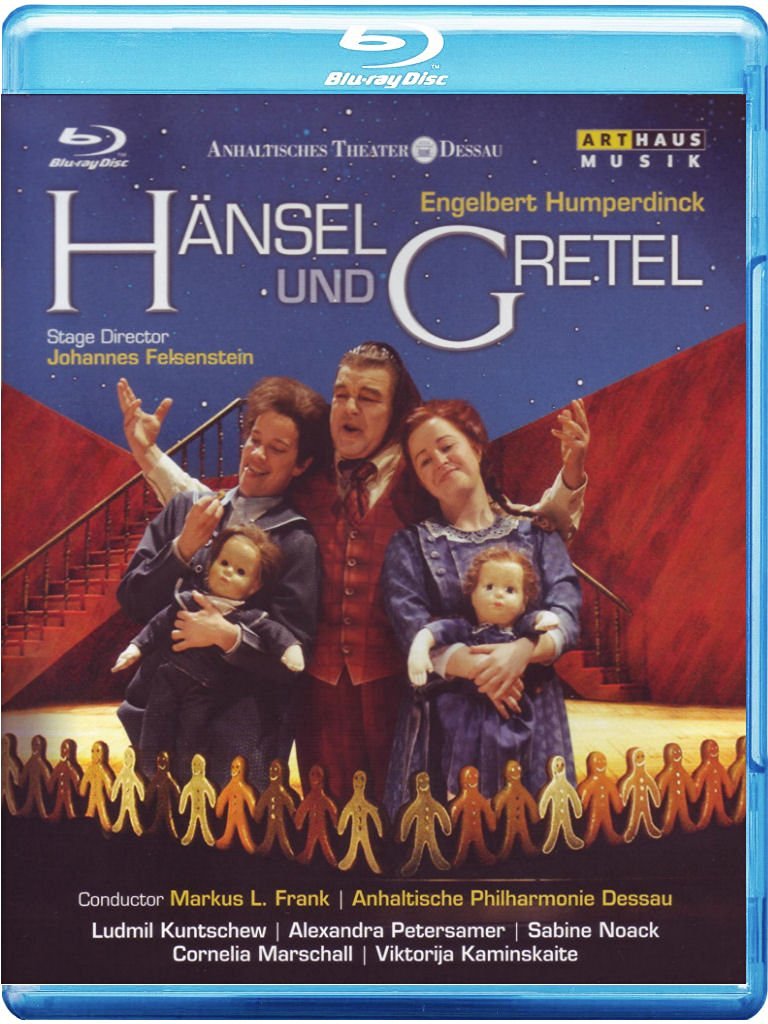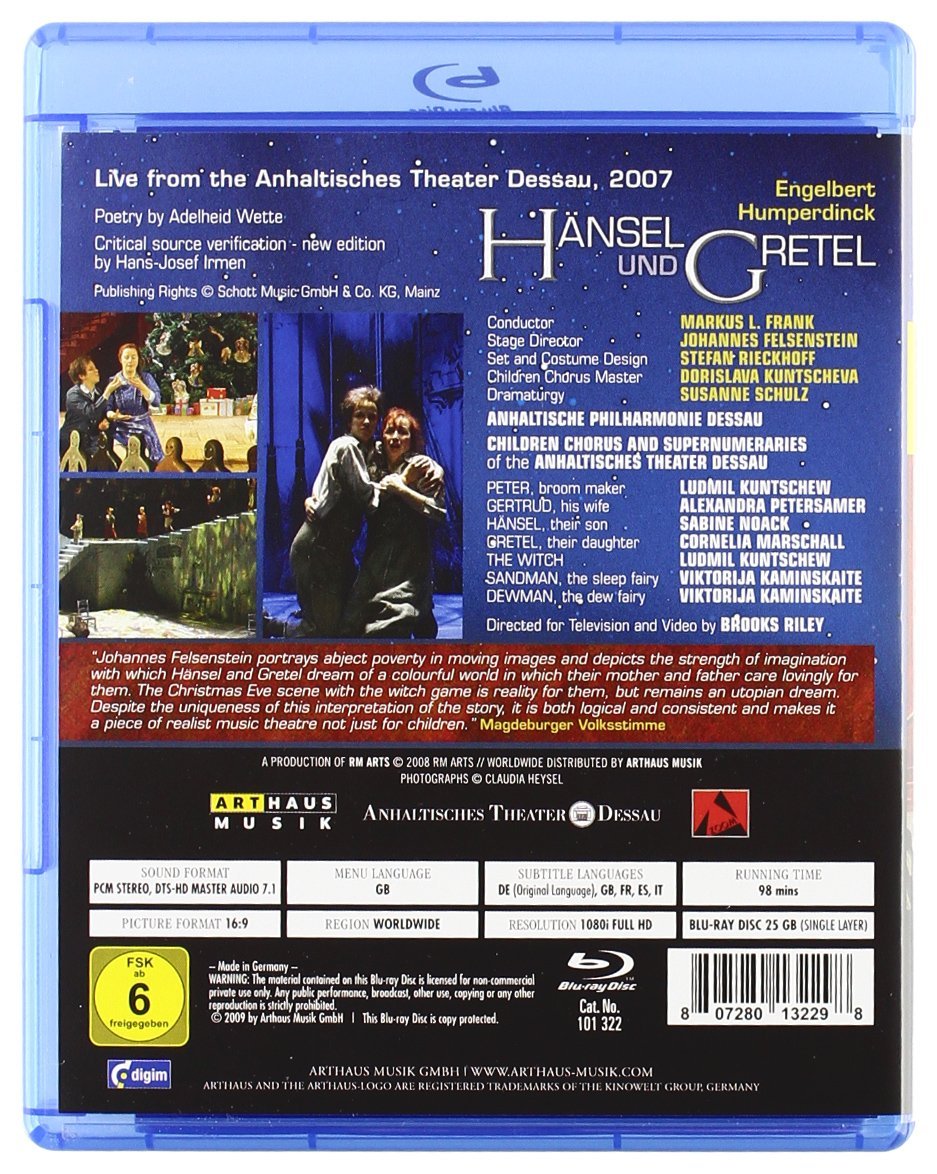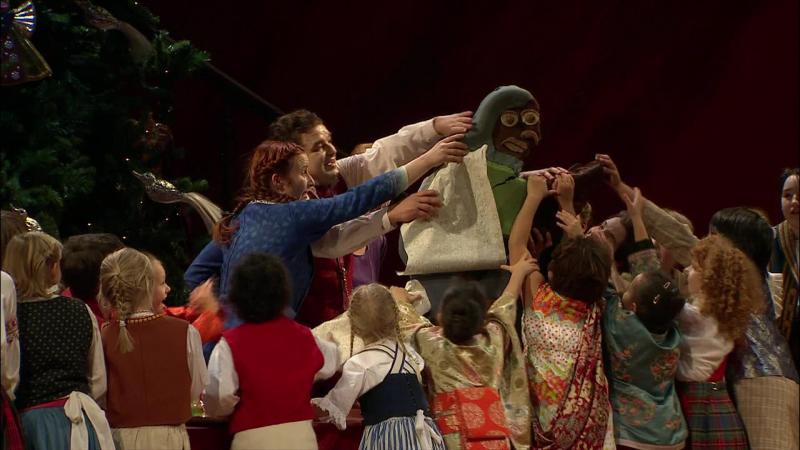

Engelbert Humperdinck Hänsel und Gretel opera with revised libretto by Hans-Josef Irmen (based on, but different from the traditional poetry of Adelheid Wette, the composer's sister). Directed 2007 by Johannes Felsenstein at the Anhalt Theatre Dessau. Stars Ludmil Kuntschew (Peter, the broom maker/the Witch), Alexandra Petersamer (Gertrud, Peter's wife), Sabine Noack (Hänsel, the son), Cornelia Marschall (Gretel, the daughter), and Viktorija Kaminskaite (Sandman/Dewman). Markus L. Frank conducts the Dessau Anhalt Philharmonic and the Anhalt Theatre Children's Choir (Chorus Master Dorislava Kuntscheva). Set and costumes by Steghen Rieckhoff; dramaturgy by Susanne Schulz. Directed for TV by Brooks Riley. Sung in German. Released 2009, disc has 7.1 dts-HD Master Audio. Grade: A
Overture and Act 1 - Hunger
Arthaus offered this Hänsel und Gretel the same year (2009) the Royal Opera House released their glittering traditional version with Opus Arte. But director Johannes Felsenstein in Dessau had a secret weapon to make make up for his relatively unknown musicians and tight budget for sets and costumes: a point of view. Felsenstein gives each Act of the opera a meta-meaning that relates to the history of the German people in the 20th century.
The theme of the Overture and Act 1 is Hunger. The Overture is filled with grim archive images such as this:
And there is no doubt that our Hänsel und Gretel are living on the brink of starvation:
Except that today a neighbor shared a bit of milk with the destitute family:
But even this meager treat gets ruined:
Mother orders the children to scour the forest for berries. Fail not in finding something to eat, or else:
The children get lost in the forest. When Father returns, he reminds his wife about the danger the children face alone in the woods:
The Witch who finds lost children and cooks them for her dinner:
Act 2 - Disaster and Rescue
Below a flaming oven. (Felsenstein uses general film records in his videos; no Holocaust theme is intended.)
The siblings are terrified in the forest at night:
But the Sandman helps them go to sleep. There are a lot of children in this cast and the production is aimed at children as well as their parents:
14 Angels protect Hänsel und Gretel. The Angels are themselves children, each dressed in traditional costumes of different foreign countries from all over the world:
Act 3 Reconstruction
So Hänsel und Gretel survive their encounters with the forest and the Witch. They get another chance to live and thrive normally:
As did most of the other children of the world during the Cold War. Well, not all, as the famous image of the little burned girl in Vietnam reminds us:
And now Germany is rich and prosperous again. Now Hänsel und Gretel live in Berlin (in the background are famous Berlin monuments to the destruction of the wars):
The traditional fairy tale of Hänsel und Gretel makes a big deal of the Witch and her kitchen. Felsenstein keeps, I think, all of the libretto and music intact (though different from the traditional version). But the Witch gets only a few moments of airtime as the director focuses on his allegory. Below Hänsel und Gretel are charmed by the gingerbread house. We know, of course, that the gingerbread figures, lined up like a picket fence, are cooked kids whom the Witch hasn't yet eaten:
In a beautiful scene too complicated to capture in screenshots, the trapped children are freed and turn out to be the very Angels who once saved Hänsel und Gretel in the woods:
But there's still opportunity for some fairy-tale gore as the Witch turns up as this giant cookie that the children greedily devour:
And now we are back with the same famous music from the beginning of the opera:
Few Germans alive today have any personal responsibility for what happened in Germany between 1900 and 1945. Now they can without guilt be thankful for the astonishing success the German nation has enjoyed since the end of World War II. So this Hänsel und Gretel becomes a parable for them of giving thanks to God for their good fortune; and, by extension, a prayer for security and welfare of all the peoples of the earth. This production came along before the outbreak of so much new warfare in the Middle East and Africa. Now huge numbers of fresh children are threatened by the Witch. I admire the Germans for the way they have aggressively taken on the role of Angels in this new, deep, dangerous forest.
Children can enjoy this recording, but they will sense that there are things here only the adults can completely grasp. Every time I watch this, it sticks with me for several days.
Here's a clip. There's not much out there from the critics. We may be the only ones who see how precious this is:
OR























